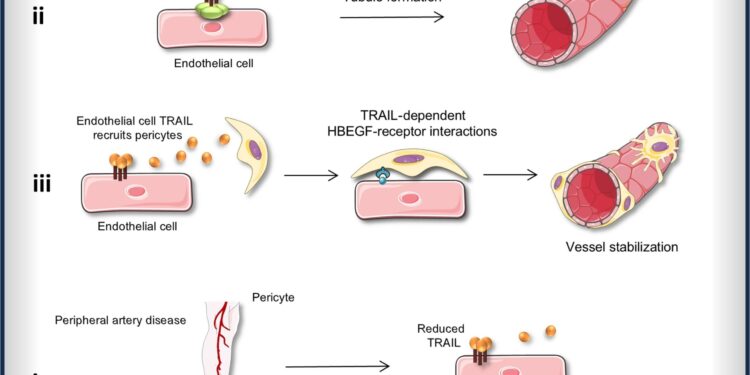Credit: Scientific advances (2024). DOI: 10.1126/sciadv.adn8760
Researchers at the Heart Research Institute (HRI) have made a new discovery: An existing drug used to kill tumor cells in cancer patients could also be used to save the limbs of patients with blocked leg arteries.
A preclinical study conducted by HRI’s Center for Peripheral Arterial Disease (PAD) found that conatumumab can effectively treat PAD, a vascular disorder that causes abnormal narrowing of arteries in the lower extremities, by effectively growing new blood vessels, bypassing the blockage and restoring blood flow to affected parts of the body.
The research paper was published in Scientific advances.
Dr Siân Cartland of the HRI Center for PAD and lead author of the research paper, says the breakthrough could save limbs and lives.
“We often refer to PAD as the minor cousin of heart attack and stroke because we know much less about it and, therefore, treatments are less advanced,” Dr. Cartland said.
“The surprising discovery that a drug developed to kill cancer cells can restore blood flow to areas affected by PAD gives us a whole new hope of reversing the disease.”
PAD is a type of cardiovascular disease that affects one in five older Australians and is responsible for one limb amputation every two hours. There is currently no treatment to stop the disease, the best option is to slow its progression.
Associate Professor Mary Kavurma, who directs HRI’s Center for PAD, says the preclinical discovery paves the way for a rapid move to human trials.
“The drug was tested in preclinical models of PAD and in vitro on cells and arteries collected from PAD patients who had undergone amputation.
“All the toxicology and safety studies of this drug have already been done as an anticancer drug, which is a major hurdle that we will not have to overcome,” explained Associate Professor Kavurma.
“Knowing that the drug is safe to use in patients, we can now move to the next stage of research very quickly.”
This advancement is part of HRI’s ongoing commitment to tackling PAD, following the launch of the PAD Center earlier in 2024. This centre, in collaboration with the Royal Prince Alfred and Concord repatriation hospitals as well as that the University of Sydney, constitutes a major project. hub for PAD research, recruitment, outreach and mentoring.
More information:
Siân P. Cartland et al, Generation of stable microvessels in ischemia is mediated by endothelial cell-derived TRAIL, Scientific advances (2024). DOI: 10.1126/sciadv.adn8760
Provided by the Heart Research Institute
Quote: Cancer drug could be used to save limbs of patients with peripheral arterial disease, preclinical study suggests (October 11, 2024) retrieved October 11, 2024 from
This document is subject to copyright. Except for fair use for private study or research purposes, no part may be reproduced without written permission. The content is provided for informational purposes only.



